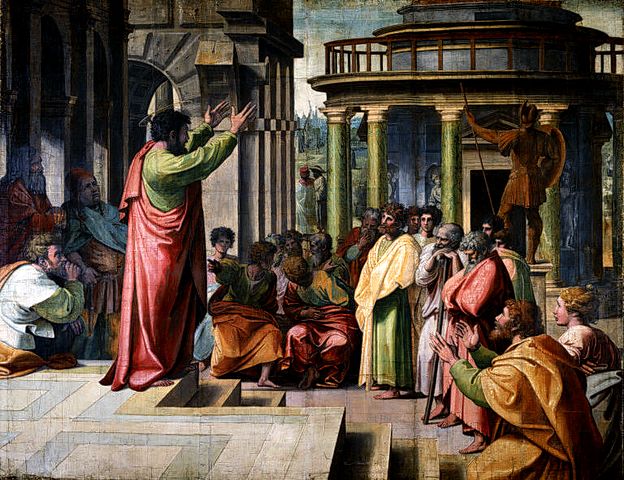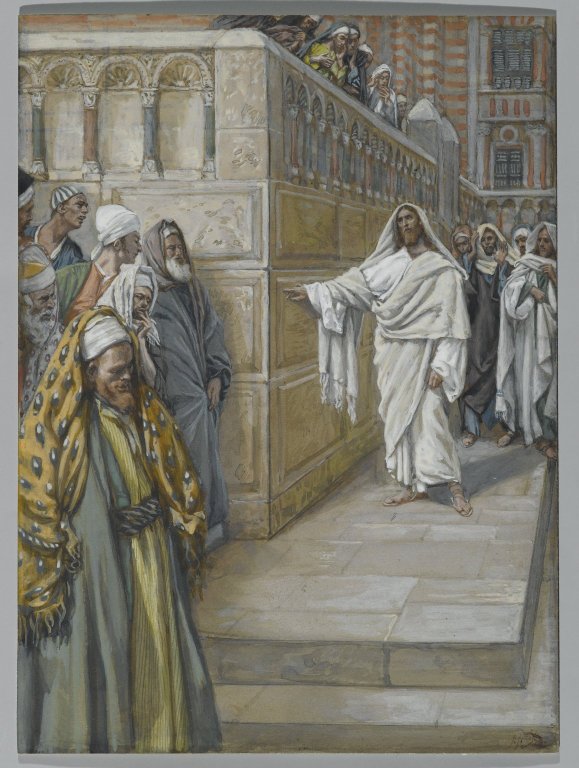
Here is part 6 of an essay from Gary Deddo on the nature of the church and its ministry. For other parts of the essay, click a number: 1, 2, 3, 4, 5, 6, 7, 8, 9, 10, 11, 12. We encourage you to add your thoughts and questions in the “comments” box at the end of each post to get a discussion going. To read the full essay in booklet form, click here. To read the related essay, “Clarifying Our Theological Vision,” click here.
Gary delivered two lectures related to this essay at the recent New Pastors Orientation Conference in Glendora, CA. Videos of the lectures have been posted on YouTube:
- Click here to watch Reading and Interpreting Scripture with Trinitarian Eyes.
- Click here to watch GCI Doctrines and How to Teach Them.
A Brief Theology of the Church
(with a view to equipping the saints for the work of ministry)
by Dr. Gary Deddo
Part 6: The church’s ministry of worship and witness
As we noted last time (part 5 of this essay), the primary focus of the church’s ministry is to proclaim Christ. That proclamation occurs in multiple ways, including (as we saw in part 5) through Christ-centered preaching. This time we’ll see how proclamation also occurs through the church’s worship and witness. As shown in the diagram below, worship (R1) is the church’s direct witness to Christ through its vertical interaction with the Father (F), Son (S) and Holy Spirit (HS) as we gather for worship services. Witness (R2) is the church’s indirect worship of the triune God through its horizontal interaction with the world, reaching out (locally and globally) to proclaim the gospel. Note that worship and witness, along with preaching, go together in proclaiming Christ.

Worship (direct witness)
The first responsibility of church leaders is seeing that the Word of God (Living and written) is proclaimed in and through the church’s worship. Biblical worship is first about who God is, not what we do for God, or even who we are in relationship to God. With this God-ward focus, worshippers are helped to respond to who God in Christ is revealed to be. In worship, we are freed by the Spirit to respond with faith, hope and love for Jesus Christ as we confess our need for forgiveness and receive God’s grace.
The content of worship
The content of the church’s worship should involve the reading of Scripture along with the declaration (via preaching and/or discussion) of its message centering on Jesus Christ. That presentation should be done in a way that draws out from the hearers a Spirit-led response of prayer, praise, thanksgiving and confession. The worship service should then provide multiple opportunities for such response to be expressed. Primary ways are the giving of offerings and the administration of the church’s two sacraments: baptism and the Lord’s Supper. It is GCI’s recommendation (but not requirement) that the Lord’s Supper be conducted weekly.

When conducted properly, worship points people to Christ, ushering them into his presence. By the Spirit, Jesus truly is present in our worship, serving (as noted in Hebrews 8:1-2) as the church’s one true Worship Leader (Leitourgos) and High Priest. The worship of the church is thus our participation in Jesus’ worship of the Father, which he gives in our place and on our behalf. That worship has two dimensions: God to humans, and humans to God.
The God-humanward dimension of worship
The church’s worship first involves receiving from God—from the Father, through the Son, in the Spirit. Jesus, our High Priest and Worship Leader, first ministers the things of God to us, making God known and giving us all the blessings that he accomplished for us in his earthly ministry in the name of the Father. Jesus thus mediates to us both the revelation and the reconciliation of the Father. This is the God-humanward dimension of Jesus’ High Priestly ministry, and this is where the church’s worship begins (and thus continues).
The human-Godward dimension of worship
The church’s worship also involves responding to God—in the Spirit, through the Son, to the Father. Note that this human-Godward dimension of worship is also Christ’s ministry on our behalf. Jesus not only brings the things of God to us, but takes us with him to the Father. Having reconciled us to the Father, Jesus leads us into the Father’s presence. As our Worship Leader and High Priest, Jesus leads us in our worship of the Father.
Our sanctification
Every response of faith, hope and love that Jesus makes toward God, he makes in our place and on our behalf. He then sends the Spirit so that we, more and more, may share in his responses on our behalf to God. This is the life of being sanctified. It is a life grounded in and flowing out from the work of the Son of God who, in our place, assumed our fallen nature.
Jesus’ faithful responses to God were the outcome of his overcoming temptation and his victory over evil. Through his sacrificial life that culminated in his crucifixion and resurrection, Jesus took our fallen human nature and recreated and regenerated (sanctified) it. And now, through the ongoing ministry of the Holy Spirit, we grow up into Christ—so that our lives might be more and more receptive and conformed to him, sharing in Jesus’ own sanctified human mind and heart, coming to love the will and ways of God. Flowing from our renewed lives in Christ comes the desire to share Christ with others so they too can join in.
The role of the Holy Spirit
This ministry of the Holy Spirit is thus essential for our sanctification/transformation. The Spirit, who is sent to us from the Son in the Father’s name, and from the Father in the Son’s name, is the same Spirit who the incarnate Son of God received for us at his baptism. He always had the eternal Spirit for himself as a member of the Trinity, but from the point of his baptism, he also came to have the Spirit for us, in his own human form. Jesus has the Holy Spirit for us so that we also, as human beings, might be indwelt by the Spirit. For that to happen, the human nature Jesus assumed had to be sanctified as he lived his life as our great High Priest. So Jesus is said in Scripture to have sanctified himself (John 17:19), that is, his human nature. As we share in our great High Priest’s responses, especially in worship, we bear witness to this truth and reality.
Thus, from beginning to end, the Triune God is the subject of biblical worship. Worship is not about us, not even about how well we worship. Jesus Christ, as our great High Priest, is present and active. He first ministers to us in the name of the Father and by the Holy Spirit. Then he takes our worship, joins it with his own, and in doing so perfects it—sanctifies it, as it “reaches” the Father. In worship we look away from ourselves. In humility we even forget ourselves, looking to be reminded of who God is so that we might respond simply, but fully, to the truth and reality of who he is as proclaimed in his Word and also through our actions as we gather for worship.
Worship through music
Though music is certainly an important aspect of our worship, it should not be used in ways that draw attention to itself or to the musicians. Instead, worship music should point to the true object of our worship, our Triune God. Worship is not entertainment put on for others to watch. All worship leaders should strive to help other worshippers re-apprehend God in his revelation and promote (make room for) participation in worship that focuses on God, providing and supporting ways to respond to who God is according to his self-revelation. None of our worship is perfect—all of it needs to be sanctified as we join in worship with our great High Priest and Worship Leader Jesus Christ. We offer all our worship to him for his sanctification, which he graciously and even happily accomplishes on our behalf, leading us into the presence of the Father by the Spirit.

Worship through preaching
As we noted last time, preaching is an essential and large part of our worship. The focus of preaching is to identify and remind ourselves of the nature and character of God as revealed in Jesus. The content of preaching will be Scripture as it points us to our Triune God and our life in him. Such preaching is not primarily about conveying information (as is the case with teaching). Preaching aims to strengthen and encourage in the hearers a response of faith, hope and love on the basis of who our Triune God has revealed himself to be: our Lord and Savior.
Biblical preaching does not primarily address the will, telling people what or how to do something for God. Instead, it proclaims the nature and character of God in Christ, speaking in his name and on his behalf to the hearers, addressing them in a way that calls forth their faith, hope and love for God. As this response is awakened in them by the Spirit, the hearers may be guided in making appropriate responses to God’s grace, love, forgiveness and transforming presence through acts of obedience, which includes direct and indirect acts of witness (see the section below). The church then has the responsibility to provide opportunities that make room for this response in the context of worship, through praise and adoration, prayer, confession of sin, singing, testimony (in words or perhaps in actions such as dance, works of art, music), and most especially by baptism and regularly sharing in the sacrament of the Lord’s Supper following the proclamation of the Word of God in preaching and Scripture reading.
Witness (indirect worship)
The church also offers opportunities for the hearers to express their faith, hope and love for God outside the worship service. Such opportunities are typically referred to as “outreach events,” and rightly so. God’s love reaches out, calling us to himself and away from all that alienates us from him. Outreach events proclaim the gospel, thus pointing people to the God revealed in Jesus. Such outreach (witness) events are indirect witnesses to who God is. Though they might focus more on deeds (actions) than words, their source, and the identity of Christ’s church, should never be hidden or obscured. All we do we do in the name of our Lord Jesus Christ.
The range of deeds in outreach events can be quite varied. Evangelism is a form of outreach and comes in many varieties. Not all of them, however, are equally faithful. Sharing the gospel with non-believers, as directly as is allowed or appropriate in a given context, is the key. The form of evangelism should match the content of our evangelistic message, which focuses on the free grace of God and call for repentance and faith to receive God’s mercy and kindness.
Deeds proclaiming the gospel include acts of kindness, service and assistance that convey faith, hope and love for God and love for others in his name. This “missional” activity will largely be focused on reaching out to the church’s immediate context (neighborhood, community; socio-economic setting). However, at times, it will also reach out to other communities and cultures, even to other nations, in what is referred to as “missionary” activity. Our outreach, therefore, is both local and global.
Disciple-making
Another important aspect of the church’s witness is commonly referred to as disciple-making (or making disciples, quoting Jesus’ command in Matthew 28:18 to “make disciples of all nations”). To make disciples is to help people grow in their faith, hope and love for God outside of the time of worship. The primary focus of this disciple-making is the character (being) of the disciple—God is far more concerned about what kind of people we become than in what we do for him. The quality of what we do for him depends, to a large degree, on the kind of persons we are—our nature, character, spirit.
Disciple-making activities lie somewhere between worship and witness (outreach) and can take many forms. It can occur one-on-one, in small groups, in classes (such as Sunday school) and in formal education such as ACCM or GCS courses. It can also take place through reading authors (both ancient and contemporary) who are mature in their faith, hope and love for God. A key concept here is that no one grows in the faith on their own. We all are made for community, and we mature in community. We find healing and wholeness in being members of the body of Christ. We should not expect that a weekly worship service provides all that a believer needs to grow up into the maturity of Christ.
Thus pastoral leaders need to provide resources (especially from their own faith community—GCI in our case) along with hands-on opportunities that will help members grow in their devotion to God and knowledge of his Word, thus growing in Spirt-led lives that express joyful obedience to God. Such opportunities will include involving members in the outreach, service and mission activities of the church. It also, at times, will mean providing pastoral counseling and, if needed, referral to professional counselors for individual, marital, or family counseling.
Know the “cultural soup we swim in”
In all aspects of the church’s worship and witness (including disciple-making), each church must be aware of and responsive to the social, economic and intellectual-educational context in which they live, and to which they seek to reach out. We need to know our “audience,” which means knowing the “cultural soup” they “swim” in! This “soup” includes influences, forces and cultural patterns, including some that tempt us to depart from Christ and his ways, or at least misinform us about God and his ways. Special resources are often needed to help us “read” (interpret) the culture. Such awareness will help direct and focus the assistance we are able to provide to those we are called to serve. That assistance will include pointing out evil where it exists and is damaging to the communities we serve. The church will provide, as it is able, the resources of its own community and assistance to those caught in sinful or evil circumstances to find spiritual healing and hope and practical ways to escape sin and its damaging effects.
The church in the world
The central task of the church and the goal of its ministry is not to change anything. The church is not primarily a social change agent. That is not its calling. Rather, its God-ordained vocation is to point to Jesus Christ—to know him and to make him known. That includes knowing and loving God’s purposes and ways and what it means to be a human being in right relationship with God.
If there is to be change in the world, be it small or great, it will come about as God enables members of the body of Christ to make use of their education, wealth and vocations outside the immediate membership of the church. Change will come to the wider world as church members build relationships outside the immediate church community. Such relationship-building will, no doubt, be resisted at times. But it also will be received by some, leading to individuals in one’s sphere of influence becoming worshipers of God through our direct witness (we call it evangelism).
However, the overall social structures of the world may or may not change much as a result of our evangelism, even when individuals are renewed and transformed by God’s grace. Such massive change is up to the providence of God. As his representatives, bearing his message of revelation and reconciliation, we bear and embody partial, provisional and temporary signs of the coming fullness of his rule and reign. Our task is about building up the church of Jesus Christ and not about building the kingdom of God on earth. God is Lord over history; his kingdom rule and reign has been inaugurated already and will come to fullness upon Christ’s return. Of that we can be sure. In the meantime, we live in hope, actively bearing witness to that hope here and now, whether or not there is much or any social, political, or economic change.
Conclusion: the church’s primary vocation
We conclude by noting that the church’s calling (vocation) is to bear witness to who Jesus Christ is, and to then invite others to receive him, responding to him in repentance and faith—entering into a life-long relationship with him as their Lord and Savior. Acting as a kind of spiritual midwife, we introduce people to Jesus and help them enter a relationship with him of faith, hope and love, becoming worshipers of the Triune God. God is seeking such worshipers, and we join him in this primary ministry of witness, directly through our worship and indirectly through our outreach involving evangelism, service and mission. Thus we understand that the primary vocation of the church and its leadership is to be faithful to Christ—to know him and to direct others to him through the church’s words and deeds of proclamation. Note how the apostle Paul makes this point in Romans 1:15-16:
That is why I am so eager to preach the gospel also to you who are in Rome. For I am not ashamed of the gospel, because it is the power of God that brings salvation to everyone who believes: first to the Jew, then to the Gentile.













